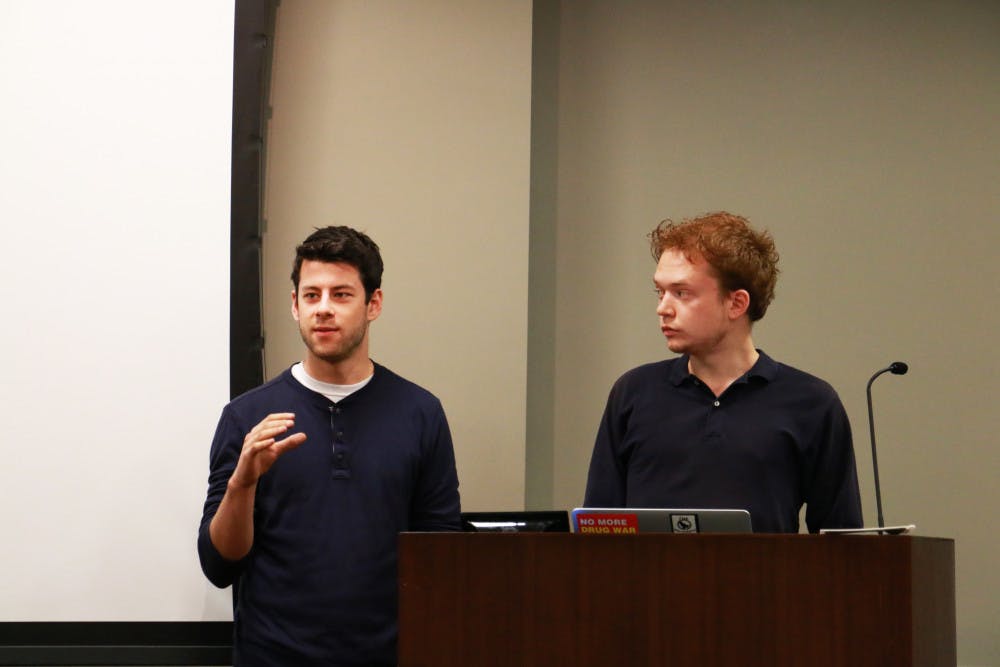Besenia Rodriguez ’00, senior associate dean for curriculum and a member of the Task Force on Diversity in the Curriculum, discussed the taskforce’s recommendations to help departments address issues of diversity and inclusion at the Undergraduate Council of Students’ general body meeting Wednesday. Liza Cariaga-Lo, vice president for academic development, diversity and inclusion and co-chair of the Diversity and Inclusion Oversight Board, also addressed the recently released Departmental Diversity and Inclusion Action Plans.
The taskforce, which includes faculty members, undergraduates and the dean of the College, has issued six major recommendations, including the re-categorization of Diverse Perspectives in Liberal Learning courses under another designation, Rodriguez said. She added that the College Curriculum Council, which has oversight over curriculum designations, has not yet approved the taskforce’s proposal to use Race, Power and Privilege as the new course categorization.
“The reason for highlighting race in particular, the taskforce felt, was that it’s often the category that is silenced,” Rodriguez said. The taskforce decided to change the current categorization after it discovered that, despite not knowing much about the DPLL designation, “most students really wanted to take more courses on questions of privilege, questions of power — more social categories, like sexuality and class and gender and race,” Rodriguez added.
By training Meiklejohns and faculty advisors in the meanings and purpose of the new course designation, the taskforce hopes to “signal the institution’s commitment to increasing the number of those courses,” Rodriguez said. Once the CCC has discussed the taskforce’s proposal, the broader campus community will be asked to comment, and then a vote will take place within the CCC, she added.
The courses falling under the new designation will be subjected to a more rigorous evaluation process and asked to comply with more specific criteria, Rodriguez said. “One of the critiques of the current system is that there was criteria, but it was so broad,” she added. “Even if it’s a much smaller number of courses, it might be a much more valuable tool.”
Though the taskforce considered recommending a diversity course requirement, it decided not to as it would be against “the spirit of Brown,” Rodriguez said. “We should provide as many opportunities as possible, but students should be able to follow their own interests and find ways of learning around these questions that are related to their concentrations,” she added.
Other recommendations made by the taskforce include introducing more “introductory (and) survey” courses that focus on “pressing themes” relating to diversity and inclusion, Rodriguez said. These classes may be interdisciplinary courses taught by more than one professor, and they should be equipped with teaching assistants who are “trained around inclusive pedagogy” and able to facilitate difficult and challenging conversations, she added.
The taskforce also recommended more support and training in inclusive pedagogy from the Sheridan Center for Teaching and Learning for faculty members “who want to push the boundaries of their knowledge to be better teachers,” Rodriguez said. She added that, because of traditional training, faculty members can sometimes be “fearful about opening up an area of discussion in their classes that they may not feel like they are experts in or feel comfortable even facilitating.”
Cariaga-Lo said that many DDIAPs feature inclusive pedagogy training and that the DIOB hopes to eventually develop a systematic training program and set of resources. “We need to build resources, but we also need to build the capacity to be able to offer up these trainings,” she added. “As we continue to build those resources, there will be more and more demand.”
Cariaga-Lo cited programs proposed by smaller departments with fewer students of color as a way in which the study and discussion of diversity and inclusion can be extended to all curricula. Certain study abroad and research programs can facilitate “more nuanced conversations and discussions around issues of diversity and inclusion,” Cariaga-Lo said. She added that internships and interdisciplinary conversations have also been suggested as a means of expanding the reach of education in diversity and inclusion.
Later in the meeting, Alex Nibley ’19 and Michael Kaplan ’19, representatives of Students for Sensible Drug Policy, also spoke to the council about their club’s objectives. The club — part of a national organization that focuses primarily on harm reduction and safety as opposed to drug prohibition — is focused on expanding its Spring Weekend water station, Nibley said.
Kaplan added that the group hopes to implement changes in orientation programs that address drug and alcohol use. The rhetoric on substances used during first-year orientation “is not clear. It doesn’t lead to the best practices. It doesn’t actually lead to safety,” he said.
The club also wants to continue to run an anonymous drug testing service in the period leading up to Spring Weekend, Nibley said. “For students purchasing drugs from illegal vendors, this service ensures that you’re going to have a safe experience and something bad isn’t going to happen that’s unexpected,” Kaplan added.





